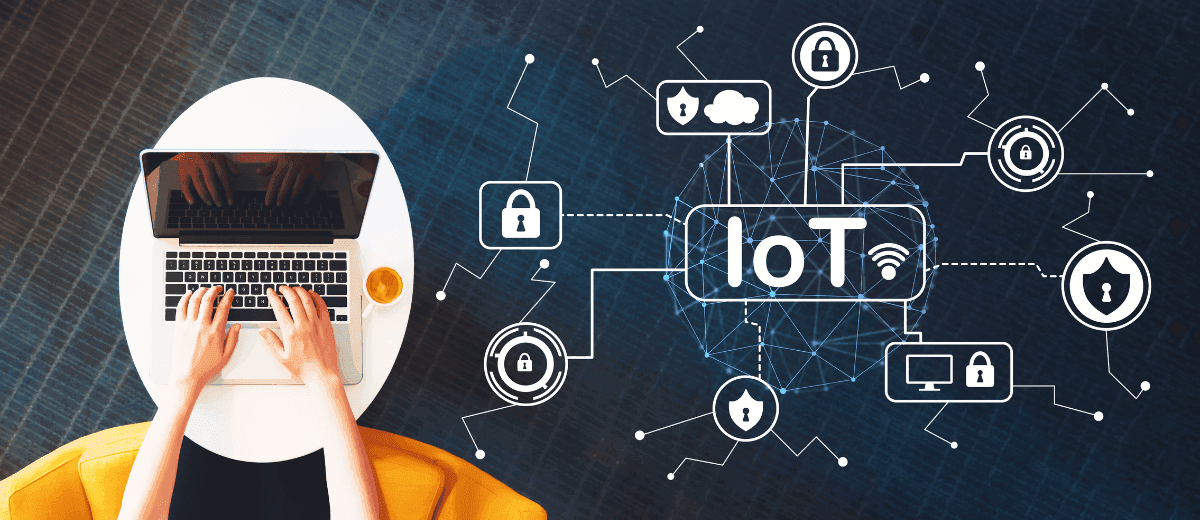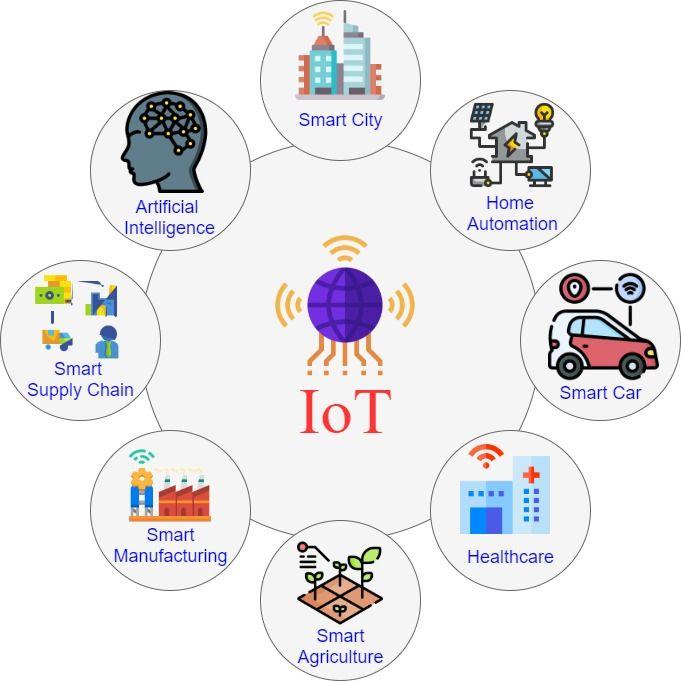- 11th Oct, 2024
- Kinjal D.
IoT Landscape in Saudi Arabia: A Market Overview
3rd Apr, 2024 | Nisha D.
- Internet of Things

The Internet of Things (IoT) has been rapidly transforming industries worldwide, and Saudi Arabia is no exception.
With its Vision 2030 plan driving digital transformation, the Kingdom is witnessing a surge in IoT adoption across various sectors.
This article provides an in-depth analysis of the IoT landscape in Saudi Arabia, exploring the scope of the market, key drivers of adoption, top trends in 2025, and the future outlook of IoT in the Kingdom.
Scope of the IoT Market in Saudi Arabia
With a revenue of US$11.62 billion in 2024, the IoT market in Saudi Arabia is positioned for significant growth, reflecting its vast potential and promising future.
Let's delve into the market scope of IoT in Saudi Arabia, supported by key statistics from Statista.
1. Market Segment Definition
The IoT market segment encompasses interconnected devices and systems that facilitate data exchange and communication over the internet, driving innovation and efficiency across various sectors.
2. Dominance of Automotive IoT
Among the diverse sectors within the market, IoT in Automotive Industry leads the way with a market volume of approx US$3.86 billion in 2024.
This shows how important and promising IoT technologies are for automotive industry, especially in Saudi Arabia.
3. Annual Growth Rate
The IoT market in Saudi Arabia is expected to demonstrate an annual growth rate of 10.17% between 2024 and 2028, as measured by the compound annual growth rate (CAGR).
This steady growth trajectory indicates the continuous expansion and adoption of IoT technologies across sectors.
4. Future Market Volume
By 2028, the IoT market in Saudi Arabia is expected to reach a market volume of US$17.12 billion, further underscoring the increasing significance and integration of IoT technologies in sectors such as automotive, healthcare, manufacturing, and more.

Key Drivers of IoT Adoption in Saudi Arabia
The country's Vision 2030, which aims to diversify its economy and reduce its dependence on oil, has played a significant role in accelerating the adoption of IoT.
Several key drivers are fueling the growth of IoT in Saudi Arabia:
1. Government Initiatives
The Saudi government has started many projects to encourage the use of IoT.
These include the National Transformation Program (NTP) and the Saudi Vision 2030, which emphasise the importance of IoT in transforming various sectors such as healthcare, transportation, and energy.
2. Digital Infrastructure Development
Saudi Arabia has made significant investments in developing its digital infrastructure, including high-speed internet connectivity and data centres.
This infrastructure is essential for supporting IoT applications and devices.
3. Smart City Projects
The country is actively investing in smart city projects, such as NEOM and Riyadh Smart City, which rely heavily on IoT technologies to improve the quality of life for residents and enhance the efficiency of urban services.
4. Rising Demand for Energy Efficiency
With the increasing demand for energy efficiency, IoT solutions are being deployed to monitor and optimise energy consumption in buildings, industries, and transportation.
5. Healthcare Innovation
The healthcare sector in Saudi Arabia is witnessing significant innovation through the adoption of IoT.
Remote patient monitoring, telemedicine, and smart healthcare systems are becoming increasingly prevalent.
6. Security Concerns
The need for enhanced security measures is driving the adoption of IoT in Saudi Arabia.
IoT solutions are being used to monitor and secure critical infrastructure and assets.
7. Partnerships and Collaborations
Collaborations between local and international technology companies are playing a crucial role in driving IoT adoption in Saudi Arabia.
These partnerships bring together expertise and resources to develop and deploy innovative IoT solutions.
Top IoT Trends in 2025
The Internet of Things (IoT) continues to evolve rapidly, with new trends and technologies shaping its landscape.
In 2025, several key trends are expected to drive the growth and adoption of IoT across various industries.
Let's explore some of the top IoT trends for 2025:
1. AI Support for IoT
Artificial Intelligence (AI) is increasingly being integrated into IoT systems to enhance their capabilities.
AI-powered analytics can process large amounts of data generated by IoT devices, providing valuable insights and enabling predictive maintenance and intelligent decision-making.
2. IoT in Healthcare
The healthcare industry is leveraging IoT to improve patient care and streamline operations.
IoT devices such as wearable health monitors, smart medical devices, and remote patient monitoring systems are enabling healthcare providers to deliver more personalised and efficient care.
3. Generative AI in Wearables
Generative AI is revolutionising wearables by enabling them to adapt to users' needs and preferences.
Wearable devices powered by generative AI can provide personalised recommendations, adaptive settings, and predictive insights, enhancing user experience and functionality.
4. IoT and Digital Twins
Digital twins are like virtual copies of real things, like objects, processes, or systems.
IoT is increasingly being used to create and maintain digital twins, enabling real-time monitoring, simulation, and analysis.
Digital twins help organisations optimise operations, improve performance, and reduce costs.
5. Edge Computing
Edge computing is becoming increasingly important in IoT deployments.
By processing data closer to the source (at the edge of the network), edge computing reduces latency, enhances security, and enables real-time decision-making, making it ideal for IoT applications that require fast response times.
6. 5G Connectivity
The introduction of 5G networks will speed up how quickly IoT is used.
5G offers faster speeds, lower latency, and higher capacity, enabling more devices to be connected and facilitating the growth of IoT applications such as autonomous vehicles, smart cities, and industrial automation.
7. IoT Security
With the proliferation of IoT devices, ensuring security is paramount.
In 2025, there will be a greater focus on implementing robust security measures, such as encryption, authentication, and access control, to protect IoT devices and data from cyber threats.
8. IoT in Supply Chain Management
IoT is changing how goods move through supply chains by showing their location in real time.
IoT devices such as RFID tags and sensors enable companies to track inventory, monitor conditions, and optimise logistics operations.
Future Outlook of IoT in Saudi Arabia
Looking ahead, the future of IoT in Saudi Arabia appears promising, with several factors contributing to its growth and evolution.
As the Kingdom continues to invest in digital infrastructure and smart city projects, machine learning algorithms will be increasingly integrated into IoT systems, enhancing their capabilities and enabling more intelligent and efficient operations.
Similarly, virtual reality technology will continue to be used in conjunction with IoT devices, creating immersive experiences and transforming industries such as healthcare, education, and entertainment.
The rollout of 5G networks will also play a crucial role in driving IoT adoption, enabling faster speeds, lower latency, and higher capacity for IoT devices.
With a conducive regulatory environment and a growing ecosystem of technology companies and startups, Saudi Arabia is well-positioned to capitalise on the opportunities presented by IoT, shaping the future of the Kingdom's digital economy.
More blogs in "Internet of Things"
- 26th Apr, 2021
- Jay D.
A Gentle Introduction to Internet of Things
- 27th Jan, 2025
- Rohit M.
IoT in Automobile Industry: A Complete Guide For 2025
Join our Newsletter
Get insights on the latest trends in technology and industry, delivered straight to your inbox.









